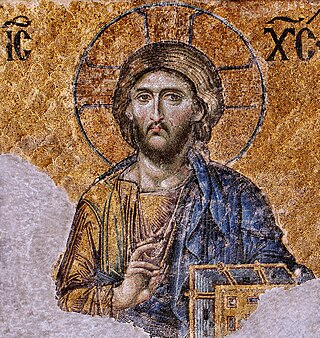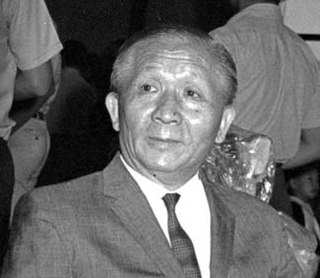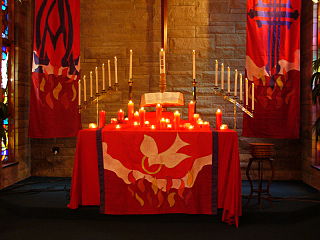In Christianity, Sabellianism is the Western Church equivalent to Patripassianism in the Eastern Church, which are both forms of theological modalism. Condemned as heresy, Modalism is the belief that the Father, Son and Holy Spirit are three different modes of God, as opposed to a Trinitarian view of three distinct persons within the Godhead. However, Von Mosheim, German Lutheran theologian who founded the pragmatic school of church historians, argues that Sabellius "believed the distinction of Father, Son, and Holy Spirit, described in the Scriptures, to be a real distinction, and not a mere appellative or nominal one."

John Nelson Darby was an Anglo-Irish Bible teacher, one of the influential figures among the original Plymouth Brethren and the founder of the Exclusive Brethren. He is considered to be the father of modern Dispensationalism and Futurism. Pre-tribulation rapture theology was popularized extensively in the 1830s by John Nelson Darby and the Plymouth Brethren, and further popularized in the United States in the early 20th century by the wide circulation of the Scofield Reference Bible.

In the Eastern Orthodox Church, in Eastern and Latin Catholic churches, and in the teaching of the Church Fathers which undergirds the theology of those communions, economy or oeconomy has several meanings. The basic meaning of the word is "handling" or "disposition" or "management" of a thing, or more literally "housekeeping", usually assuming or implying good or prudent handling of the matter at hand. In short, economia is a discretionary deviation from the letter of the law in order to adhere to the spirit of the law and charity. This is in contrast to legalism, or akribia, which is strict adherence to the letter of the law of the church.
The local churches are a Christian group which was started in China in the 1920s and have spread globally. The basic organizing principle of the local churches is that there should be only one Christian church in each city, a principle that was first articulated by Watchman Nee in a 1926 exposition of the seven churches in Asia in Revelation 1:11. The local churches do not take a name, but some outsiders referred to the group as the "Little Flock" as they sang from a hymnal entitled Hymns for the Little Flock.

Witness Lee was a Chinese Christian preacher and hymnist belonging to the Christian group known as the local churches in Taiwan and the United States. He was also the founder of Living Stream Ministry. Lee was born in 1905 in the city of Yantai, Shandong, China, to a Southern Baptist family. He became a Christian in 1925 after hearing the preaching of an evangelist named Peace Wang and later joined the Christian work started by Watchman Nee. Like Nee, Lee emphasized what he considered the believers' subjective experience and enjoyment of Christ as life for the building up of the church, not as an organization, but as the Body of Christ.
Oneness Pentecostalism is a nontrinitarian religious movement within the Protestant Christian family of churches known as Pentecostalism. It derives its distinctive name from its teaching on the Godhead, which is popularly referred to as the Oneness doctrine, a form of Modalistic Monarchianism. This doctrine states that there is one God, a singular divine spirit with no distinction of persons who manifests himself in many ways, including as Father, Son, and Holy Spirit. This stands in sharp contrast to the doctrine of three distinct and eternal persons posited by Trinitarian theology.

Watchman Nee, Ni Tuosheng, or Nee T'o-sheng, was a Chinese church leader and Christian teacher who worked in China during the 20th century. His evangelism was influenced by the Plymouth Brethren.

Living Stream Ministry (LSM), originally named Stream Publishers when founded in 1965 by Witness Lee, is a non-profit corporation currently based in Anaheim, California. LSM publishes the works of Watchman Nee and Witness Lee, including the Recovery Version of the Bible. LSM has been a member of the Evangelical Christian Publishers Association since 2002 and of the Christian Booksellers Association since 1981.
In Christian theology, baptism with the Holy Spirit, also called baptism in the Holy Spirit or baptism in the Holy Ghost, has been interpreted by different Christian denominations and traditions in a variety of ways due to differences in the doctrines of salvation and ecclesiology. It is frequently associated with incorporation into the Christian Church, the bestowal of spiritual gifts, and empowerment for Christian ministry. Spirit baptism has been variously defined as part of the sacraments of initiation into the church, as being synonymous with regeneration, as being synonymous with Christian perfection that empowers a person for Christian life and service. The term baptism with the Holy Spirit originates in the New Testament, and all Christian traditions accept it as a theological concept.

The Recovery Version is a modern English translation of the Bible from the original languages, published by Living Stream Ministry, ministry of Witness Lee and Watchman Nee. It is the commonly used translation of Local Churches (affiliation).

The Economy of Salvation, also called the Divine Economy, is that part of divine revelation in the Roman Catholic tradition that deals with God’s creation and management of the world, particularly his plan of salvation accomplished through the Church. Economy comes from the Greek oikonomia (economy), literally, "management of a household" or "stewardship".

Bibles for America (BfA) is a non-profit, religious organization dedicated to distributing free copies of the New Testament Recovery Version study Bible and Christian books by Witness Lee and Watchman Nee in the United States and Puerto Rico.
In Christian theology, the tripartite view (trichotomy) holds that humankind is a composite of three distinct components: body, spirit, and soul. It is in contrast to the bipartite view (dichotomy), where soul and spirit are taken as different terms for the same entity.
The local churches and the ministry of Watchman Nee and Witness Lee have been the subject of controversy in two major areas over the past fifty years. To a large extent these controversies stem from the rapid increase and spread of the local churches in the United States in the 1960s and early 1970s. In the 1970s they became a target of opposition of fledgling countercult ministries. Unsupported criticisms of anti-social behaviors led to three libel litigations. In addition, some criticized the teaching of Witness Lee on the nature of God, God's full salvation, and the church.
The Lord's Recovery is a term coined by the Christian preacher Watchman Nee and promoted by Witness Lee that refers to a cumulative recovery of truths lost during what they refer to as the degradation of the church beginning from the second century. Although Nee and Lee recognized that there were recoveries before the time of the Reformation, their opinion was that the Lord's recovery began with Martin Luther in the Reformation because it was from then that significant recoveries were made.

Debate exists as to whether the earliest Church Fathers in Christian history believed in the doctrine of the Trinity – the Christian doctrine that God the Father, God the Son and God the Holy Spirit are three distinct persons sharing one homoousion (essence).

The Normal Christian Life is a book by Watchman Nee first delivered as a series of addresses to Christian workers who were gathered in Denmark for special meetings in 1938 and 1939. The messages were first published chapter by chapter in the magazine A Witness and A Testimony published by Theodore Austin-Sparks. The first chapter was published in the November–December 1940 issue. This first publication of the book can be viewed in the original magazines on Austin-Sparks.Net. The messages were later compiled into a book by Angus Kinnear in 1957 in Bombay, India.

For the majority of Christian denominations, the Holy Spirit, or Holy Ghost, is believed to be the third person of the Trinity, a Triune God manifested as God the Father, God the Son, and God the Holy Spirit, each person itself being God. Nontrinitarian Christians, who reject the doctrine of the Trinity, differ significantly from mainstream Christianity in their beliefs about the Holy Spirit. In Christian theology, pneumatology is the study of the Holy Spirit. Due to Christianity's historical relationship with Judaism, theologians often identify the Holy Spirit with the concept of the Ruach Hakodesh in Jewish scripture, on the theory that Jesus was expanding upon these Jewish concepts. Similar names, and ideas, include the Ruach Elohim, Ruach YHWH, and the Ruach Hakodesh. In the New Testament it is identified with the Spirit of Christ, the Spirit of Truth, the Paraclete and the Holy Spirit.

Christian denominations have variations in their teachings regarding the Holy Spirit.
While both rhema and logos are translated into the English word, in the original Greek there was a substantial distinction. The use of the term rhema has special significance in some Christian groups, especially those advocating the Five-Fold Ministry that God gave of five gifts or callings to some people. Christians denominations that advocate the Five-Fold Ministry include Charismatic Christianity, the Pentecostal Movement, the Apostolic-Prophetic Movement and the Word of Faith Movement.











